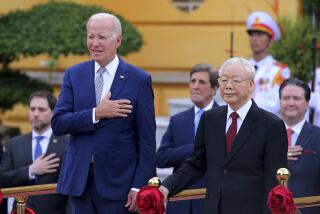Clinton Urged to Lift Vietnam Business Ban : Trade: Large-scale projects now can be financed. American firms may bid on the contracts but not act on them.
- Share via
SINGAPORE — After President Clinton decided last week to permit international development agencies to resume lending to Vietnam, U.S. business people in Asia on Monday warned the Administration that American business will suffer unless there is a speedy end to the trade embargo as well.
“It’s a rather interesting paradox: The United States is helping to fund the development of Vietnam, and U.S. firms will not be able to participate,” said Doug Henck, the Hong Kong-based chairman of the Asia-Pacific Council of American Chambers of Commerce.
Clinton announced Friday that the United States would stop blocking efforts by other nations, such as Japan and France, to clear the $140 million Vietnam owes in back payments on loans from the International Monetary Fund.
That removes the last obstacle to renewal of the IMF loans and clears the way for development assistance projects planned by the World Bank and Asian Development Bank, which have followed the IMF’s lead.
Clinton left in place a trade embargo that bars U.S. companies from doing business with Vietnam. He said progress on the issue of American servicemen missing in Vietnam “is simply not sufficient to warrant any change in our trade embargo or any further steps toward normalization.”
The IMF, World Bank and Asian Development Bank all receive substantial funds from the United States, and the concern is that they will begin offering contracts at a time when Americans companies cannot compete for them.
“In terms of business opportunities for infrastructure projects, American companies will lose out unless the embargo is lifted,” said Thomas Seale, director of the American Chamber of Commerce in Bangkok.
The embargo, imposed in 1964 on what was then North Vietnam, will expire in September unless it is reimposed by Clinton. Efforts to have the embargo lifted have been opposed by some veterans groups and relatives of Americans missing in action since the Vietnam War.
The World Bank plans to lend Vietnam between $300 million and $350 million a year, starting this year, according to Bradley O. Babson of the bank’s office in Bangkok.
Babson said that about $100 million has been earmarked for rebuilding Route 1, the two-lane, north-south highway running through the country. An additional $75 million would be spent on primary education, and about $100 million would support unspecified agricultural projects.
The IMF makes loans to its members to aid economic restructuring and financial reforms. Any assistance Vietnam receives from it is not likely to be available for such projects.
The United States holds about 22% of the shares in the World Bank and is the second-largest donor to the Asian Development Bank in Manila. Both agencies said it was unlikely that U.S. firms would lose out unless the embargo were extended into next year.
In the final days of his Administration, President George Bush relaxed the trade embargo to allow American companies to bid on and sign contracts with Vietnamese companies, but not to implement them. That means U.S. companies could join the bidding process before the embargo is lifted or expires. And, even after project plans are approved by the Vietnamese government, it will be several months before contracts go to competitive bidding.
The Trade Ministry announced Monday that several major U.S. firms, among them Citibank, General Electric and Philip Morris, have been licensed to open offices in Vietnam--also permitted under the relaxed terms of the embargo. Companies such as Boeing and General Electric hope Vietnam will be in the market for airliners, and U.S. oil companies hope to sell their expertise in drilling offshore wells.
U.S. construction companies are also keen to take part in the rehabilitation of Vietnam’s infrastructure. Much of it, at least in the south, was built by American companies.
Vietnam had a gross domestic product of $10 billion last year and hopes to double that by 2000. Nearly 20 years after the war’s end, the country remains in a state of neglect, partly due to the U.S. embargo but also because of the ravages of state control of the economy.
The Vietnamese government said it “highly appreciates” Clinton’s decision to allow development assistance to resume.
More to Read
Sign up for Essential California
The most important California stories and recommendations in your inbox every morning.
You may occasionally receive promotional content from the Los Angeles Times.










